|
While so many that embark upon their exploration of colleges are enamored by the stature of highly esteemed, private universities, they often do so without a strong sense (or clue) for their career aspirations or if such schools are a good fit to meet merely a hypothesis surrounding their desired career path. The total cost of attendance at such named private universities has surged upwards to $65k+ / year (many elite and most selective now exceed $70k / year according to www.collegedata.com). This places a huge amount of risk on spending over $250k on an education that may not produce fruit and create overarching stress and anxiety on students and parents. Aside from questioning the ROI of such a large investment, other factors such as student empowerment and career path validation are big challenges. I am not saying such elite or private colleges are bad or those who choose to fund such educations are wrong. I do think many get caught up in the romance of named schools, inflated expectations on what such schools do for their children, and for some trying to keep up with the Jones to do what they think is the very best for their children. If a college bound student has experienced first hand work life in their desired course of study and they are 99% certain it is a match, it may be worth such an investment as along as any debt the student/parents take on has a realizable payback period. It is great if say a high schooler gained insight into the accounting profession from their uncle who is a CPA, they are able to work part time or over a summer in their office to confirm their interest, they get substantial help from their parents who have the means, and can see their way to a respectable salary to rationalize a private college. Alternatively, if you are able to obtain meaningful scholarships or financial aid your investment risk can be minimized. However, I think for a large, growing percent of the population there may be a better way through a Lean Education. Lean is Not Just About Money The financial impact of having to fund 2 - 3 children through a private college education can indeed be overwhelming and substantially change parent's retirement plans and lifestyles, not to mention the rainy day fund for unplanned expenses like having to care for an aging grandparent or their own unexpected medical conditions that may arise. Young parents with 4 - 5 children are especially faced with a daunting reality given where colleges costs will be in 10 to 15 years. The attractiveness of a $25k / year (possibly less than $13k for a commuter or if scholarships/aid are awarded) in-state public college education puts things in perspective for those with amplified responsibilities. Following a lean approach, the time value of keeping $100k - $150k per child invested in the market or avoiding debt can't be underestimated. However, even if you are fortunate to have ample financial or scholarship/aid resources, there are many other benefits to a Lean Education including:
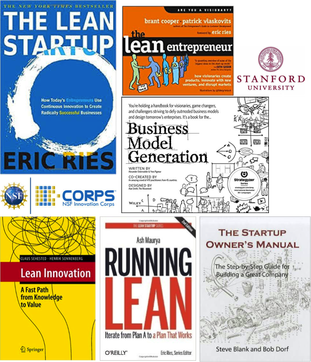 Lean Innovation Analogue For those of us in the technology sector, traditional methods for product/service development and entrepreneurship have evolved towards Lean Innovation and some learnings can be obtained for following a similar mindset towards education. Much has been written about Lean Innovation, including such things such as design thinking, agile methodologies, Google sprints, and the Lean LaunchPad curriculum at Stanford. Lean LaunchPad has become the basis for the National Science Foundation I-Corps program that spawns entrepreneurs from university researchers. Along with the Business Model Canvas tool and use of the scientific method, Lean Innovation has made its way to many large corporate enterprises. In lieu of pursuing things like waterfall style commercialization steps (ramping up large teams / cascading processes / investment with success heavily predicated on non-fully tested hypotheses), Lean Innovation embraces more experimentation and iteration throughout while in search mode where you are operating in the unknown. Once you de-risk things like the value proposition, feature sets, business model and technology feasibility, it is then all about execution on the known where added investment is warranted. Here is a summary of more Traditional vs. Lean Innovation approaches: Surging College Bubble With increasing numbers from those seeking post secondary education and international students coming to US, demand exceeds supply at most colleges that will continue to drive up college prices. This price inflation is even greater at private vs. public colleges. Most named private colleges are fine tuned around profitability with growing endowments, research budgets, and cutting edge building projects. At what price point does this change to where you see a downward shift in enrollment or the bottom falls out of student debt programs? I believe we are starting to see an early shift of more high quality applicants choosing to attend more economical public colleges. Evidence of this can be seen by the surging GPA and SAT scores at many of the more well known public university programs. For example here in Massachusetts, while UMass general entrance requirements still have a disparity with more well known Boston area private universities, their nursing, computer science and Isenberg business school has dramatically become nearly just as competitive. You cannot blame young inspiring minds for aiming high and seeking to attend elite colleges to live up to their parents' expectations. Most parents draw from their own historical experiences and perspectives, which are very stale and not calibrated with this college bubble. It is hard amid our busy lives, but a good majority of parents need to take a more active role in college planning, ROI discussions, and most importantly career inspiration and exploration. Most high schools fall short on career exposure and planning with too much focus on just the mechanics of the college application process, teaching to the tests/standards and rigid curriculum centered around propping up their test scores in order to make their school district look good. So many careers are represented by the collective set of parents in the district and I am surprised more guidance departments do not arrange job shadowing programs. This is a lost opportunity since students could explore different types of jobs first hand throughout their high school journey. 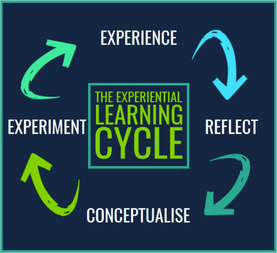 Experiential Learning and Skin in the Game Lean Innovation is centered around more rapid iteration of a "hypothesis, build, measure and learn" feedback loop. Experiential learning follows a similar cycle that applies to both curriculum concepts as well as your desired overall career focus that starts primarily with just hypotheses for your likes, dislikes, and perception if you have the required skills and stamina. The goal is to optimize this learning cycle to get out of the unknown more quickly to de-risk all sorts of things. My alma mater Northeastern University has been at the forefront of experiential learning with its long history as one of the first and few co-operative education schools in the US. Maybe this (along with the desire of going to school in Beantown) is a reason why they recently received 51k applications for 2.8k freshman seats. When both my father (also an alum) and I attended NU, it was known as a blue-collar or working person's university for folks seeking the co-op experience or a more economical big university option in the Boston area. My father worked his way through school to be the first in our family to graduate from college. I too gained an early appreciation for money by having to fund part of my education that made me take things more seriously and be fully in control of my own destiny. Aside from graduating pretty much debt free, my 1.5 years of undergrad co-op experience also enabled me to:
Today, NU through this recipe for experiential learning success, has grown through the rankings to become a more elite school. So too has tuition climbed as a private university that is challenging its ability to deliver an ideal Lean Education. While on college tours with my oldest child, I heard nearly every school pitch some form of experiential learning (made me feel real good about my own NU decision many years ago). When you peel back the onion at most schools, they are moving in the right direction, but are still only marginally better than glorified internship programs and senior capstone projects (both of which are much different than a school oriented around co-op). More colleges are starting co-op programs, but they often tend to be limited to the high demand career fields (computer science, engineering, business) where universities are able to most easily build and maintain corporate partnerships. They also tend not to transform their co-op program into a broader experiential learning philosophy. Experiential learning with integral paid job training helps directly connect students with tangible incentives and motivation. Do better in school and on work assignments and get better co-ops/internships. Obtain near-term satisfaction by connecting a learned classroom skill with job performance. Students also take more ownership when they contribute financially to their own education. All these points support the theme of students having more skin in the game. Managing Downside Risk Most of us have heard sad stories of students graduating with an expensive degree to only find out they hate their chosen career, can't find a job with a liberal arts or medieval art history degree, end up working in retail as a stop gap, or quickly learn they need another degree to land their desired job. Unless you experience this first hand as the student or parents, I am not sure you can truly understand the impact to your emotional state, family relationship, and financial well-being. There is way too much stress placed on students these days. Having the student graduate in such a state of mind after 4 or more years of hard work can be debilitating short and possibly long term. In the business world, the equivalent of such failed investment would likely be met with severe consequences. Whether it is $70k or $25k / year, vetting your headed down the right path early and often is key. This includes identification as soon as possible that college is not the right match or a gap year(s) may be warranted. Additionally, college investment at say an in-state $25k / year affords the student more opportunity for exploration or pursuit of a double major or several minors, even if it takes an extra 2 or 3 semesters. For some, a skilled trade may indeed be a better option and pathway to happiness with their college money put to better use supporting them in other ways. MVP (Minimum Viable Pathway) As folks realize later in life, your initial career focus rarely stands the test of time. People tend to pivot once they get their feet wet and get exposure to things they have no visibility into while in college or high school. Opportunities present themselves over time to motivate people to go outside their comfort zone that often has different education and experience requirements. Additionally, other priorities such as family life or stress levels impact career decisions. Of course there is also the Mark Zuckerberg and Bill Gates syndrome to cut to the chase on your passions (as long as you have the entrepreneurial bug in your belly at such a young age). Similar to building a house, an undergrad foundation should provide ample footing to build upon. In your first job, you are adjusting to work life, assessing your strengths and weaknesses, assessing if excitement or boredom prevails over time. No one knows what they will desire 20 years into the future. Your undergrad education should minimally qualify you for your first full time role you "believe" to be your best career path from the experiential learning obtained in college. I have tended to look at specific job roles and industries in 2 and 5 year windows, respectively. Given that you are likely to pivot early in your career, the lean method would point to minimizing your investment and time to start your career experience while still enabling you the flexibility to learn and navigate toward your ideal job preferences over time while earning a pay check. I equate this to an MVP (Minimum Viable Pathway) to set you off in the right direction. Upon graduation with my BS, I learned I was already doing Masters level engineering work in my first full time job and that passing on that advanced degree had been the right decision. Over the next 5 years I gained exposure to many other engineering, sales, marketing, operations roles and explored graduate school options (both patent law and an MBA). Only after direct added exposure to both career paths did I realize blending my technology background with an innovation focused MBA would propel me to a greater realm of opportunities (new foundation) and career pathways I could enjoy. I came real close to attending law school, but was blessed to realize I would go nuts buried in patent/IP proceedings and only on the peripheral of new innovation. I was fortunate to find a tech MBA program that embraced experiential learning (and fortunate my employers paid for most of my grad schooling). Along with evolving work experience, my combined undergrad and newly minted tech MBA afforded me the flexibility to continue my exploration in securing engineering management, product manager, marketing and business development roles. The obtained savings from an undergrad Lean Education can be applied towards a graduate degree, seed investment in a startup business idea, wedding, or down payment on a house. An MVP can apply to grad school also. What Have You Done For Me Lately? I have interviewed hundreds of people, including recent graduates from all sorts of schools and more seasoned professionals. While viewing a great GPA from an elite named university on a resume can be an indicator of book smarts, I am more interested in finding relevant work experience, other characteristics of transferable skills, and personal traits (integrity, work ethic, approach to critical thinking, and social skills). Yes, having a degree from Harvard, MIT, Princeton or Stanford might get you more in the door at some employers for your first job. However, unless you are targeting a tight knit industry like venture capital, this impact will dwindle significantly over time and is trumped by relevant work experience and social skills. So is spending 2 to 3 times the cost of a Lean Education on a more expensive private university a worthy investment of money and time? I content the benefits of a lean approach most often outweigh the substantial downside risks with traditional ideal college preferences and todays college bubble. Summary of Traditional vs. Lean Education Here is a summary comparison of my view on traditional college pursuits versus a Lean Education and hope more young minds and their parents consider the latter approach.
1 Comment
|
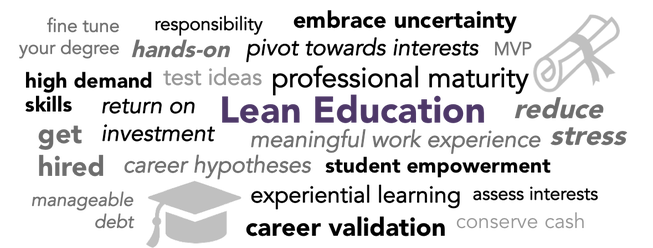
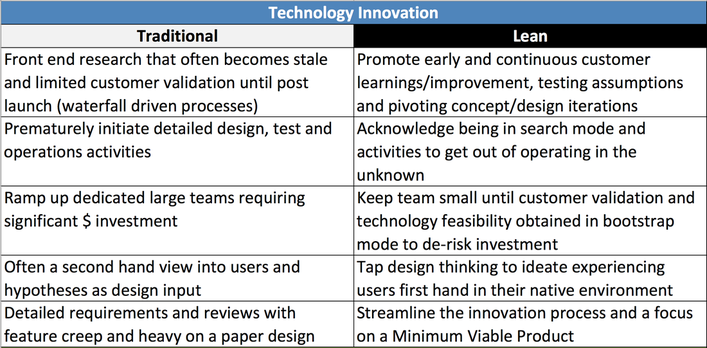
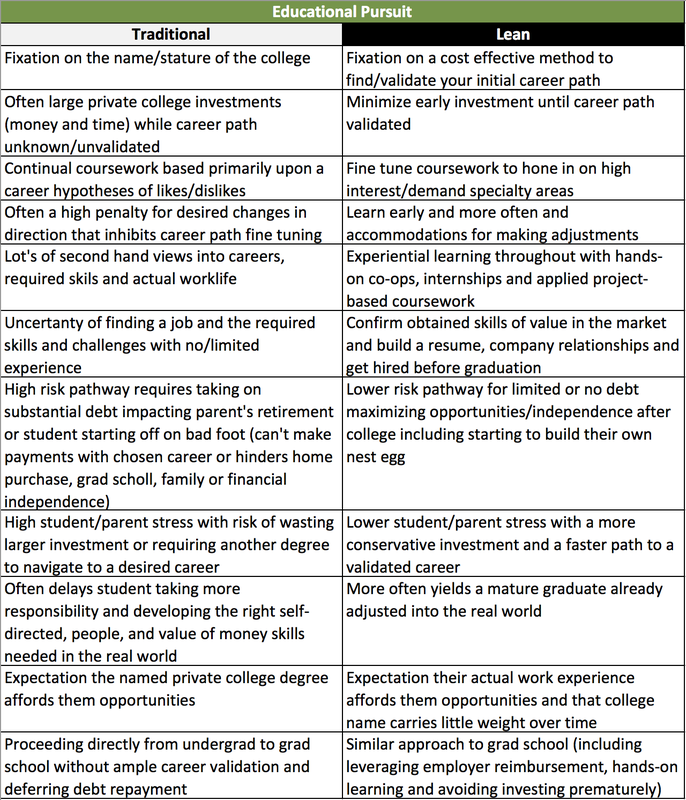
 RSS Feed
RSS Feed
